Flooring forms the foundation of any interior space, shaping its character, aesthetics, and functionality. The type of flooring you choose can either elevate or diminish the overall impression of the room.
With a plethora of flooring materials available in the market, each offering a unique blend of style, durability, and cost, choosing the right one can be a daunting task.
This guide aims to explore seven different types of flooring materials, shedding light on their benefits and shortcomings, to help you make an informed decision.
So let’s start with how to choose a flooring material.
Buying Guide: How To Choose A Floor
It’s more complicated when choosing the flooring material because it is not just about finding good-looking but also various other factors like moisture, durability, cleaning, installation, and budget.
There are some most important questions you should ask yourself before selecting a floor type.
High Moisture Area
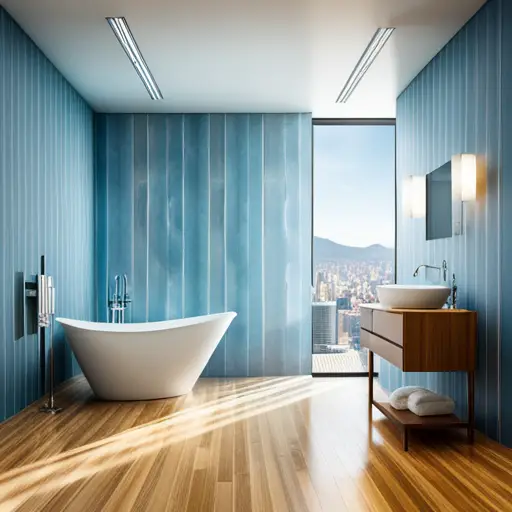
The moisture level in an area plays a crucial role in selecting the appropriate flooring material. In environments with high humidity or direct water exposure, such as bathrooms or kitchens, it’s important to choose materials that are water-resistant or waterproof to prevent damage and ensure longevity.
Options like ceramic tile, vinyl, and certain composite materials can offer durability and resistance to moisture, making them ideal choices for these settings.
On the other hand, in drier areas, a wider range of materials including hardwood and laminate can be considered without the same level of concern for moisture damage.
Understanding the moisture dynamics of a space is essential for making a flooring choice that combines functionality, durability, and aesthetic appeal.
Pet-Friendly Floors

Choosing the right flooring when you have pets in your home requires balancing durability, comfort, and ease of maintenance.
Look for materials that can withstand scratches and are resistant to moisture, such as luxury vinyl or tile, which are also easy to clean in case of accidents.
However, if warmth and comfort are priorities, consider pet-friendly carpets made from stain-resistant fibers or opt for a high-quality laminate that mimics wood but offers greater resilience against pet wear and tear.
Consider the Style
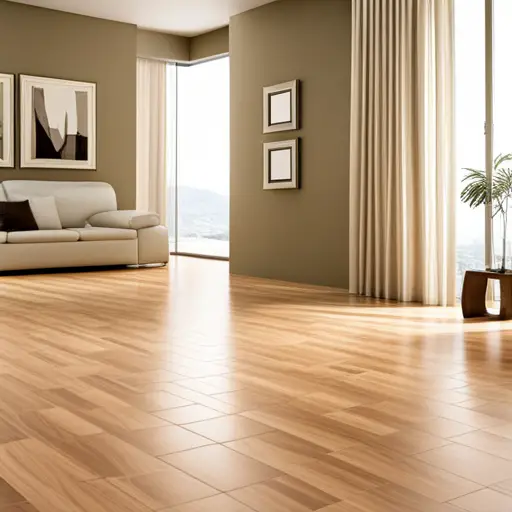
A floor plays an important role in increasing the beauty of a home. Fortunately, all flooring materials in this guide have multiple colors, patterns, and textures. That means you have multiple options.
So, you have to decide which one will more appeal to you. Because your choice would be different from others. You may like a luxurious appearance floor rather than a simple texture.
So, keep in mind these things while choosing!
Durability
How durable is a flooring material is the most important thing to consider. Because when you install flooring it should last for years. You won’t like to replace it within a few years. Especially when you spend a lot of money!
So, you should pick a more durable flooring material that can last for up to 15 to 20 years at least.
Cleaning
Cleaning a floor is also a considerable thing that can directly increase or decrease your cost. Because some flooring options need high-level cleaning and maintenance.
So, if you can’t afford an expensive cleaning method you should consider it before choosing. Moreover, you should pick a flooring material for your home that can be easily cleaned.
Installation
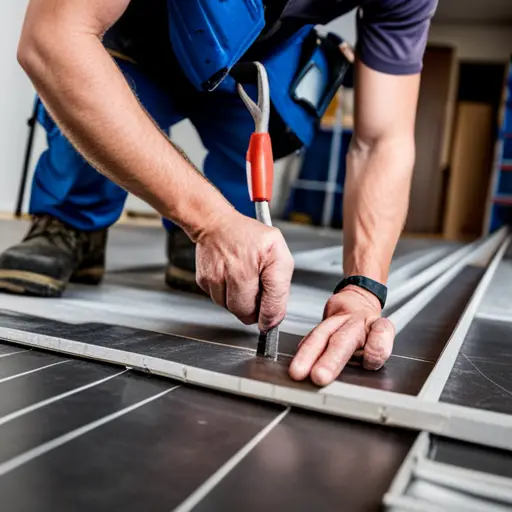
If you are going to install a floor by yourself then installation could be a considerable thing for you because some of the flooring options are harder to install than others. Like hardwood and tiles, floor materials are difficult to install.
So, you have to hire a flooring installation professional that ultimately increases your cost as well.
Budget
Your square footage budget is one of the most important things when choosing a floor. Your budget could be $2 or less, between $2 to $5, and more than $5.
With a budget of $2 or less, you will go with bargain laminate flooring that has an appearance like general wood. You can also choose resilient flooring which refers to sheets and tiles.
Normally with a low budget, you don’t have many more choices.
With the budget range between $2 to $5 or more, you will find more attractive laminates fall and luxury higher quality vinyl tiles as well.
Different Types Of Flooring Materials
1. Hardwood
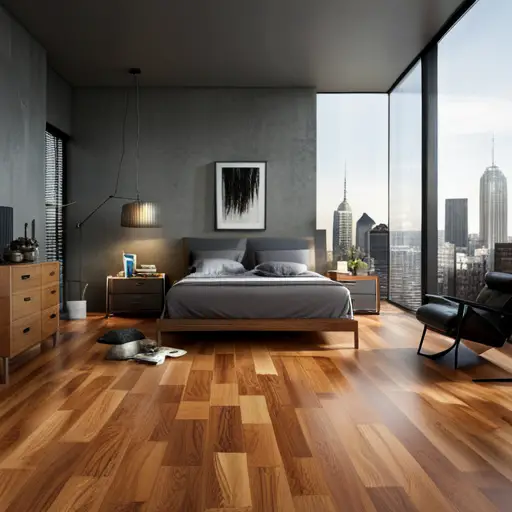
A hardwood floor is a type of wood floor that is made of wood usually from timber. Wood is a common choice for flooring nowadays with different styles, colors, and species.
It is made of one single piece of wood cut from a tree of your choice. The most commonly used woods for hardwood flooring are oak, cherry, and walnut.
It is known as one of the most luxurious floorings with a shiny look.
It is common for homes in New England, Canada, the USA, and Europe. According to Statista research hardwood flooring materials sales only in the United States amounted to 3.45 billion dollars.
Mostly the planks are thick three-quarters of one inch but the width might vary. If we talk about the standard width that is between three to five inches, called a standard or medium plank.
There is another style called wide planks and that is usually between five to ten inches.
Cost
The range of wood flooring is between $2493 to $6754 which is one of the most expensive flooring options. It includes both material and installation costs.
Over time scrapes, scratches, and dents will develop. On average, the cost of hardwood flooring ranges from $4 to $12 per square foot, with installation costs typically adding another $3 to $8 per square foot.
While the initial price tag may seem high, the long-term benefits of hardwood flooring often justify the investment.
Types of Hardwood Flooring
- Oakwood
- Maple wood
- Cherry
- Walnut wood flooring
- Ash wood
- Teak
- Jarrah
- Bamboo
- Mesquite
Pros
- Luxurious look
- More durable than engineered wood floorings like vinyl and laminate
- Long-Lasting
- Easy to clean and maintain
- Moisture resistant
- Available in various colors and styles
Cons
- More expensive
2. Laminate Floor
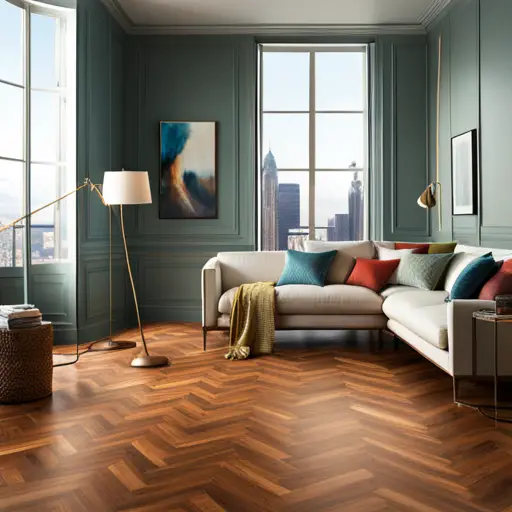
Laminate flooring is one of the best options if you want to install hardwood floors but the cost doesn’t match your budget because it mimics the real hardwood floor!
The difference between a laminate floor and a hardwood floor is that the laminate floor doesn’t contain a real wood top layer. It uses photo-realism technology of different finishes like stone, and wood, and is covered in a plastic coating.
The main advantages of laminate flooring are lower prices, ease of installation, durability, and a large variety of colors, and styles.
On the other hand, it also has the advantage that moisture can be damaged and difficult to repair.
Cost
Engineered laminate wood costs between $3 to $8 per square foot but it depends on the quality of the laminate. And $2 to $5 per square foot for its installation, it also depends on installation difficulty.
Types of Laminate Flooring
- Plastic
- Engineered wood
Installation Type
- Glued
- Glueless click
- Pre-glued
Patterns
- Thin
- Traditional
- Wide
- Chevron
Pros
- Looks like a real hardwood floor
- Waterproof and scratch-resistant
- Less expensive than hardwood
- Variety of styles
- Suitable for high foot traffic areas
Cons
- Not real and solid wood
- Hard to repair if gets damaged
3. Vinyl
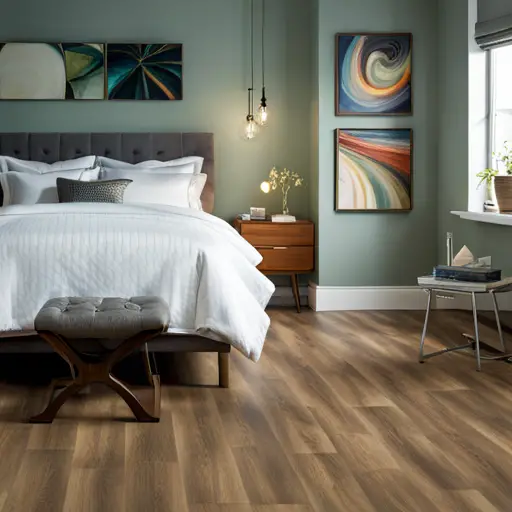
Vinyl flooring is a popular option nowadays, particularly for kitchens and bathrooms.
Vinyl flooring has further three types the first one is sheet vinyl flooring in which sheets are 6 to 12 feet wide. The sheet flooring is more resistant to water and easy to install.
The second type of vinyl flooring is luxury vinyl tile flooring which uses tiles of 9*9 to 12*12.
The third and most important type is LVP (luxury vinyl plank) flooring.
The vinyl floor could be a better option in areas with high foot traffic like hallways, entryways, bedrooms, kitchens, bathrooms, etc.
Cost
The cost of vinyl flooring per square foot can vary widely, depending on the quality, style, and type of vinyl you choose. On average, vinyl flooring costs range from $2 to $8 per square foot for standard materials.
Luxury vinyl tiles (LVT) and luxury vinyl planks (LVP), which mimic the look of natural materials such as wood and stone, can cost slightly more, ranging from $5 to $12 per square foot.
Installation costs can also affect the total price, adding $1 to $4 per square foot, depending on the complexity of the project and local labor rates.
Pros
- Looks like real wood
- Highly durable
- Water-resistant
Cons
- Hard to repair
- Less durable than wood flooring
- Difficult to remove if needed
- Less eco-friendly
Pricing
It has an affordable price and you can go with it at $3 to $15 per square foot including all types of vinyl flooring.
Related Topic: Luxury Vinyl Tile Pros and Cons: Complete Guide
4. Porcelain or Ceramic
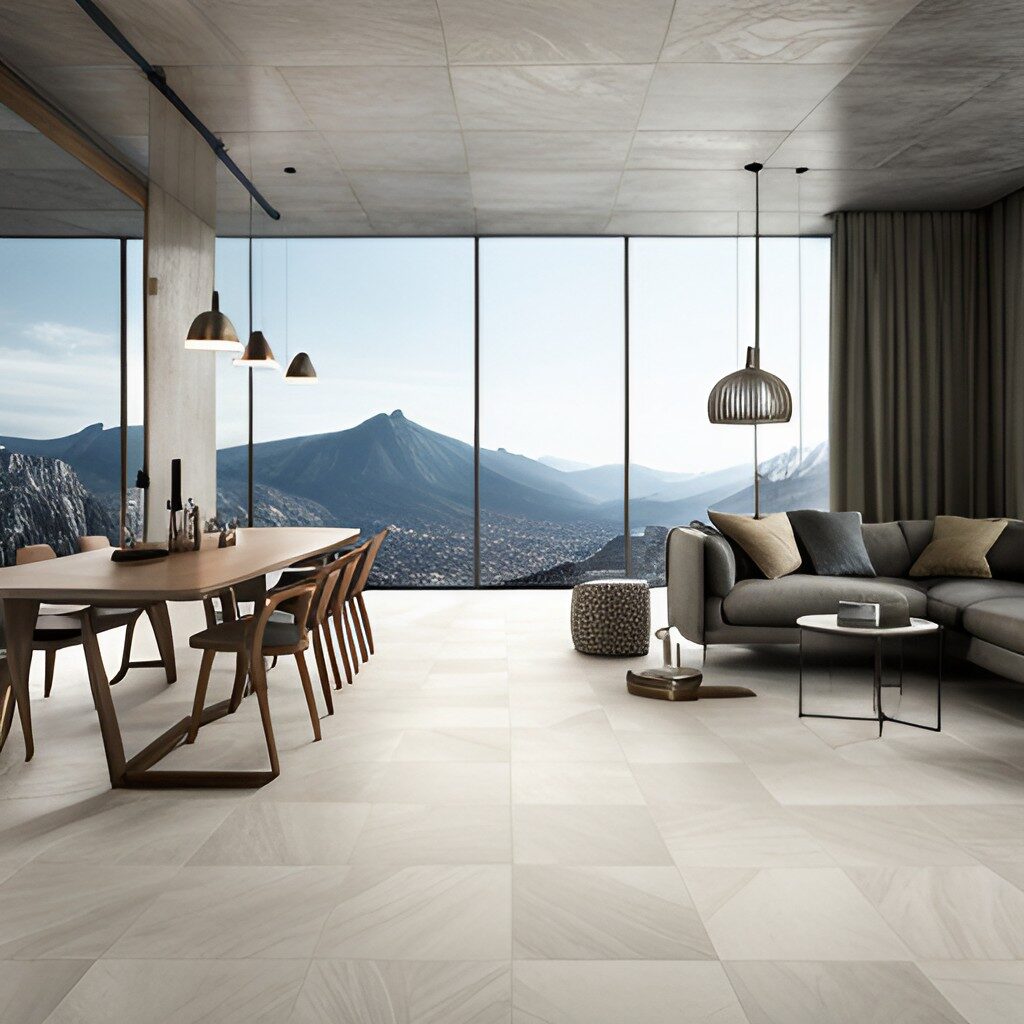
For high-traffic and moisture-prone areas, porcelain and ceramic flooring is a great option. With its good variety of looks and designs, it is durable and waterproof.
It is also a great option for kitchens, bathrooms, and entryways.
Cost
It is an expensive option at $4 to $115 per square foot. If you are going to install it by yourself then it may not be a better option for you because it is difficult to install.
But still, if you are a professional to install this type of floor by yourself and also you can afford its price, you should go with this best option.
Types of Porcelain Tiles
- Glazed
- Unglazed
- Porcelain
- Glass tiles
- Marble tiles
- Granite tiles
Pros
- Easy to clean and maintain
- Affordable
- High durability and long-lasting
- Easy to install
- Fire-resistant
- Fully water-resistant
Cons
- Hard underfoot
- Slippery when wet
- Can be cold in winter
5. Natural Stone Tile
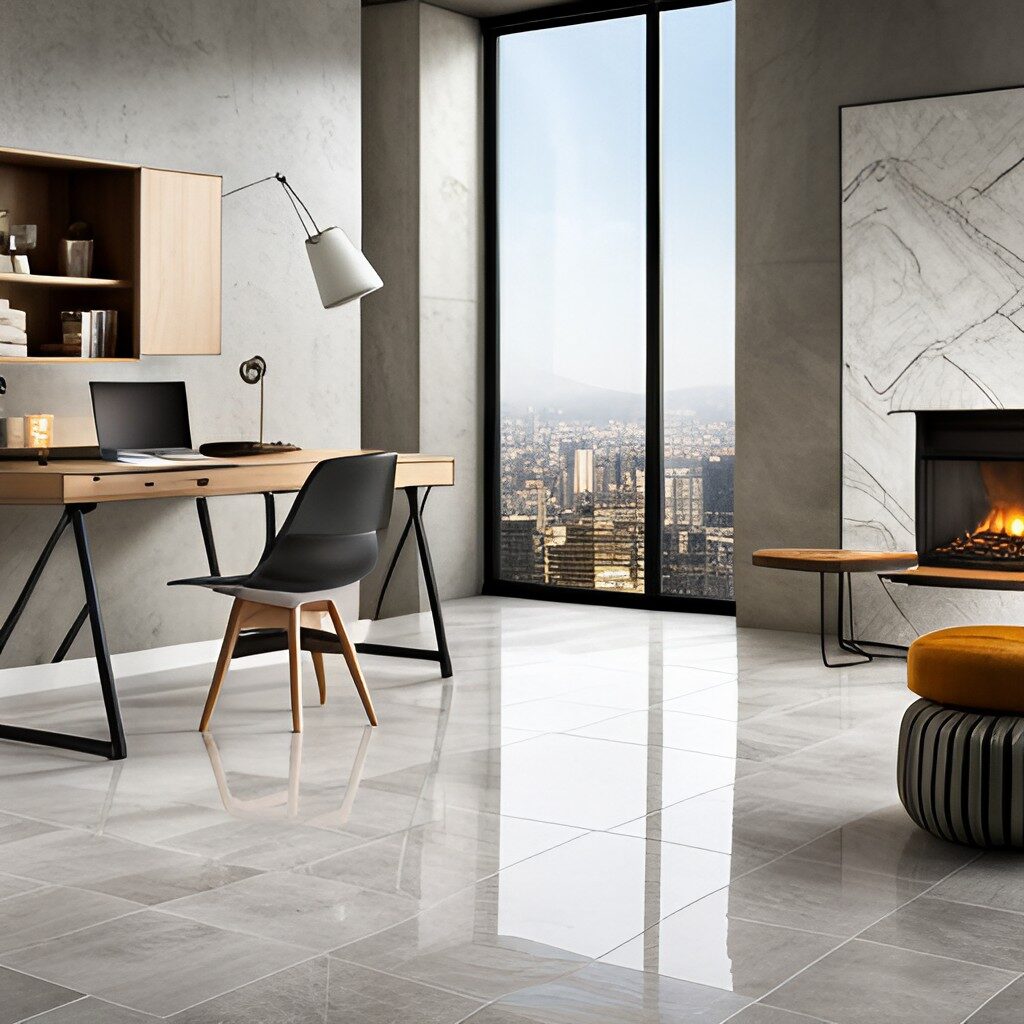
If you want a classic flooring option, natural stone tile is a great option for you with different varieties like granite, marble, travertine, and sandstone.
It also comes in various colors, styles, and shapes that make it a more classic flooring option. Almost all types of natural stone floors are durable, insulated for warmth, eco-friendly, and good for homes.
But travertine is more durable than all other types.
Cost:
It always needs professional installation at $800 to $3000 for both materials and labor which is more expensive.
Types of Natural Stone Tiles
- Marble
- Limestone
- Slate
- Sandstone
- Onyx
- Travertine
Pros
- Adds value to your home
- Keep the home cool
- Naturally beautiful
- Easy cleaning and maintenance
- Durable and long-lasting
Cons
- Slippery
- Due to hardness slips and falls accidents can lead to severe injuries
- Removal of old paint stains is hard
6. Carpet Floor
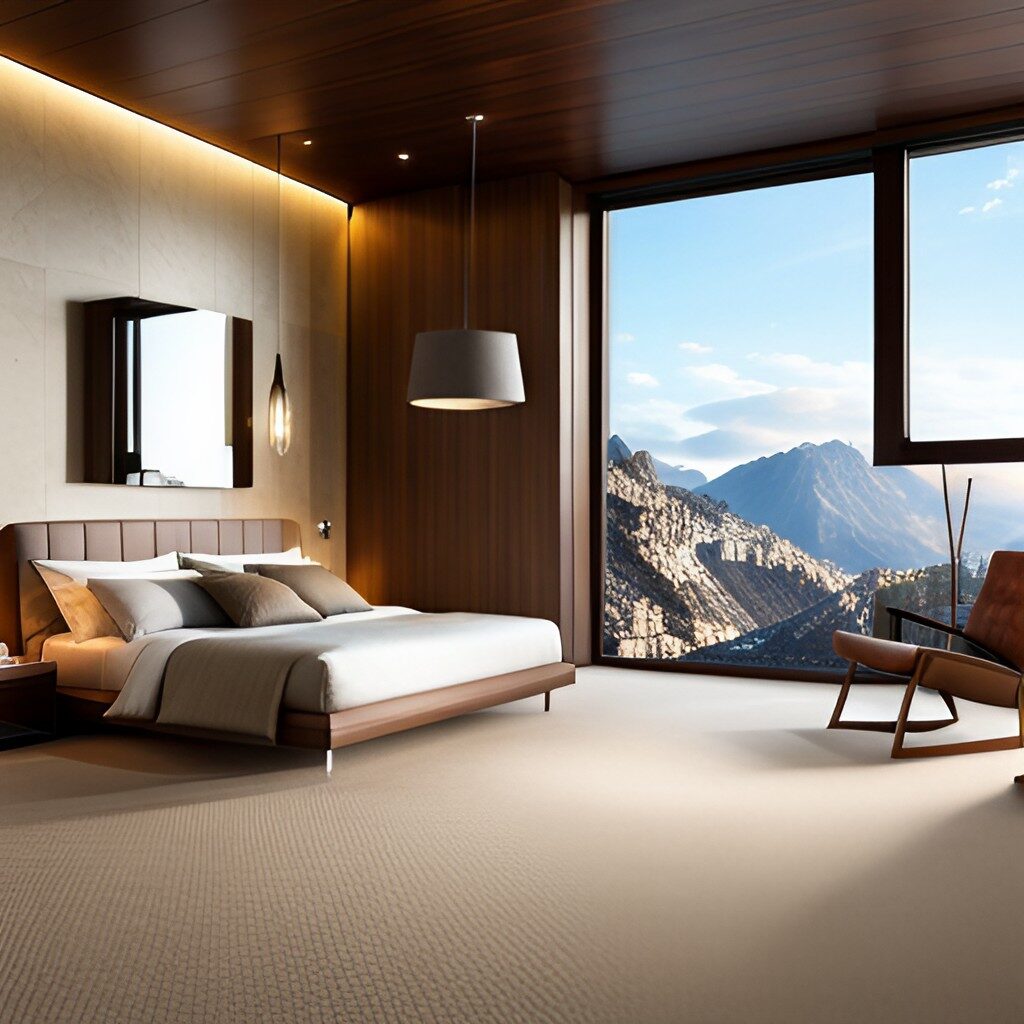
A carpet is a favorite option for many homeowners in their bedrooms with its benefits including cost-effectiveness, softness and warmth, various colors and designs, and soundproofing.
But not only this it also has some disadvantages like being difficult to maintain, not good for pets, and highly non-recommended for the kitchen and bathrooms.
If we talk about how it looks? It gives a neat and amazing look because of the variety of textures and the upper layer of the pile which is usually made of wool or fibers.
Cost
The carpet floor is one of the cheapest flooring options at $2.50 to $12 per square foot according to Forbes. You can also install it by yourself which also reduces the cost.
Types of Carpets
- Cut pile carpet flooring
- Loop pile
- Combination of cut and loop pile carpet flooring
Commonly used Fabrics in Carpets
- Nylon
- Triexta (Smartstrand)
- Polyester
- Olefin
- Wool
- Acrylic
Pros
- Inexpensive
- Softer
- More versatile
- Easy to install
- Quieter
Cons
- Needs regular maintenance
- Hard to clean
- Dirt hides inside the carpet and is impossible to remove without using a vacuum
- Shows wear and tear
Related Topic: How Long Does Carpet Last? Ultimate Guide
7. Cork Floor
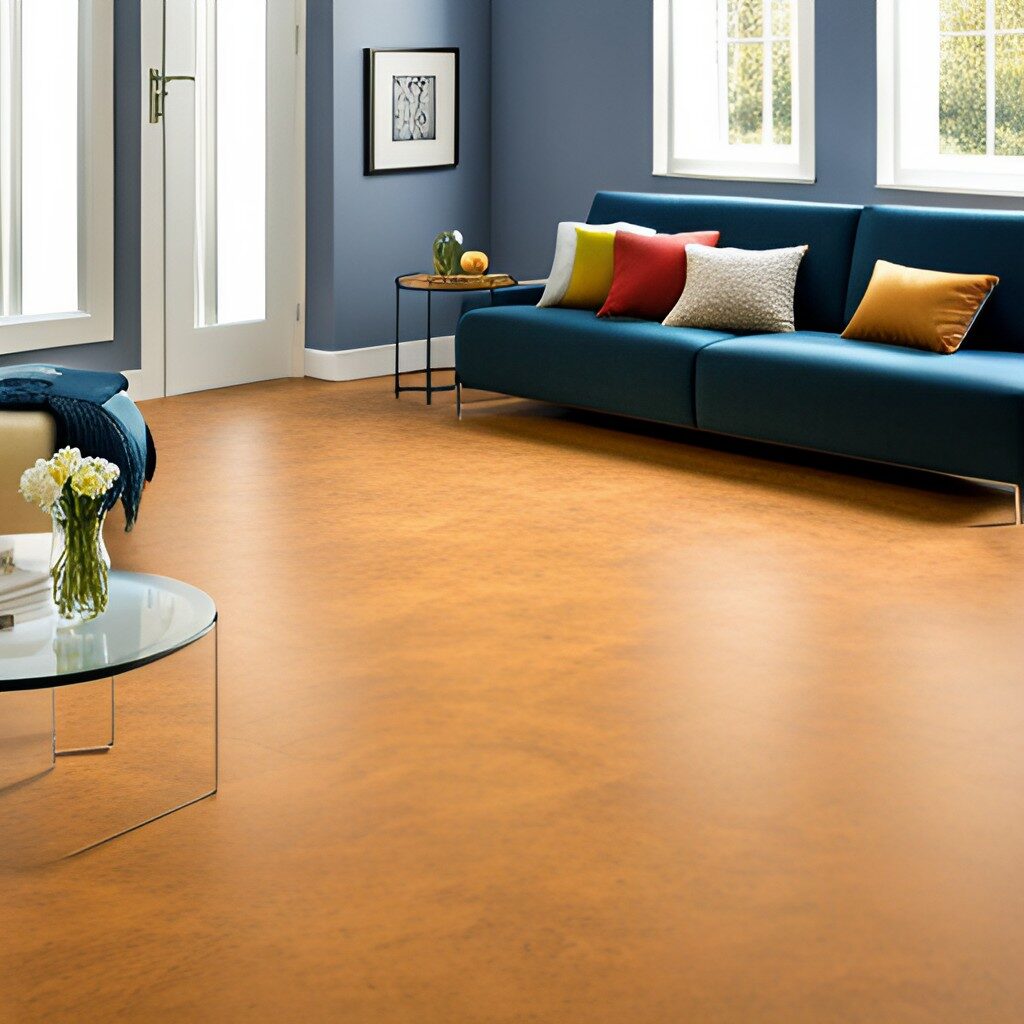
Cork has a natural look with its two types the first one is floating cork flooring and the second is cork tiles.
Floating cork flooring is easy to install. It is not solid but sandwiched with many other layers. The best thing about floating cork flooring is you can also install it by yourself.
On the other hand, cork tiles are truly something different because it is always better than floating cork flooring.
Cost
It has an affordable price with its beautiful colors and designs at $2 to $12 per square foot according to TheSpruce.
Types of Cork Flooring
- Glue down tiles
- Click together planks
Pros
- Safe and comfortable
- Classy appearance
- Fire-resistant
- Water-resistant
- More durable against cracking and abrasions
Cons
- Soft flooring material
- Get easily scratched by pet nails
- Furniture and heavy objects leave permanent dents on their surface
8. Terrazzo Flooring
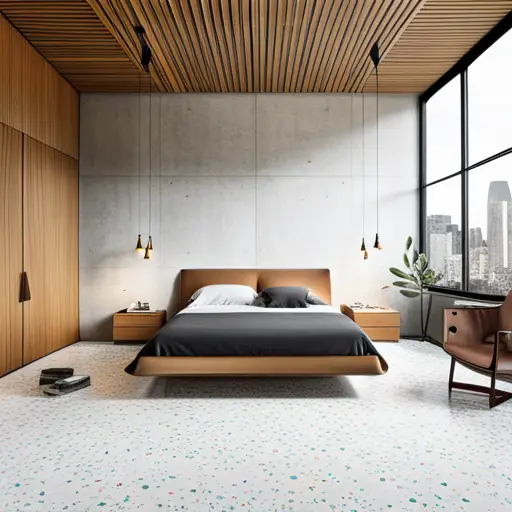
Terrazzo is a composite material that boasts a rich history dating back several centuries. Known for its sustainability and durability, Terrazzo flooring is typically composed of chips of marble, quartz, granite, or glass, embedded into cement or epoxy resin.
The blend is then polished to a high shine, creating a smooth, sleek surface that is both aesthetic and practical.
Terrazzo is highly customizable, with the ability to mix different chip colors and sizes, allowing for a unique design tailored to your specific taste. Additionally, it’s resistant to water and stains, which makes it an ideal choice for high-traffic areas such as kitchens, bathrooms, or commercial spaces.
However, it’s worth noting that Terrazzo flooring can be somewhat expensive to install, and it may feel cold or hard underfoot. Hence, it might not be the best choice for those seeking a cozy, warm ambiance.
Cost
The cost of Terrazzo flooring can vary significantly based on factors such as material type, design complexity, and geographic location. On average, the price for Terrazzo flooring installation ranges from $25 to $90 per square foot.
This wide range accounts for both labor and materials, with the specific design and the choice of stone or glass chips playing a crucial role in the final cost.
Advantages and Disadvantages
Advantages:
- Highly durable and long-lasting
- Customizable design options
- Resistant to water and stains
Disadvantages:
- Expensive installation cost
- Cold and hard underfoot
9. Epoxy Flooring
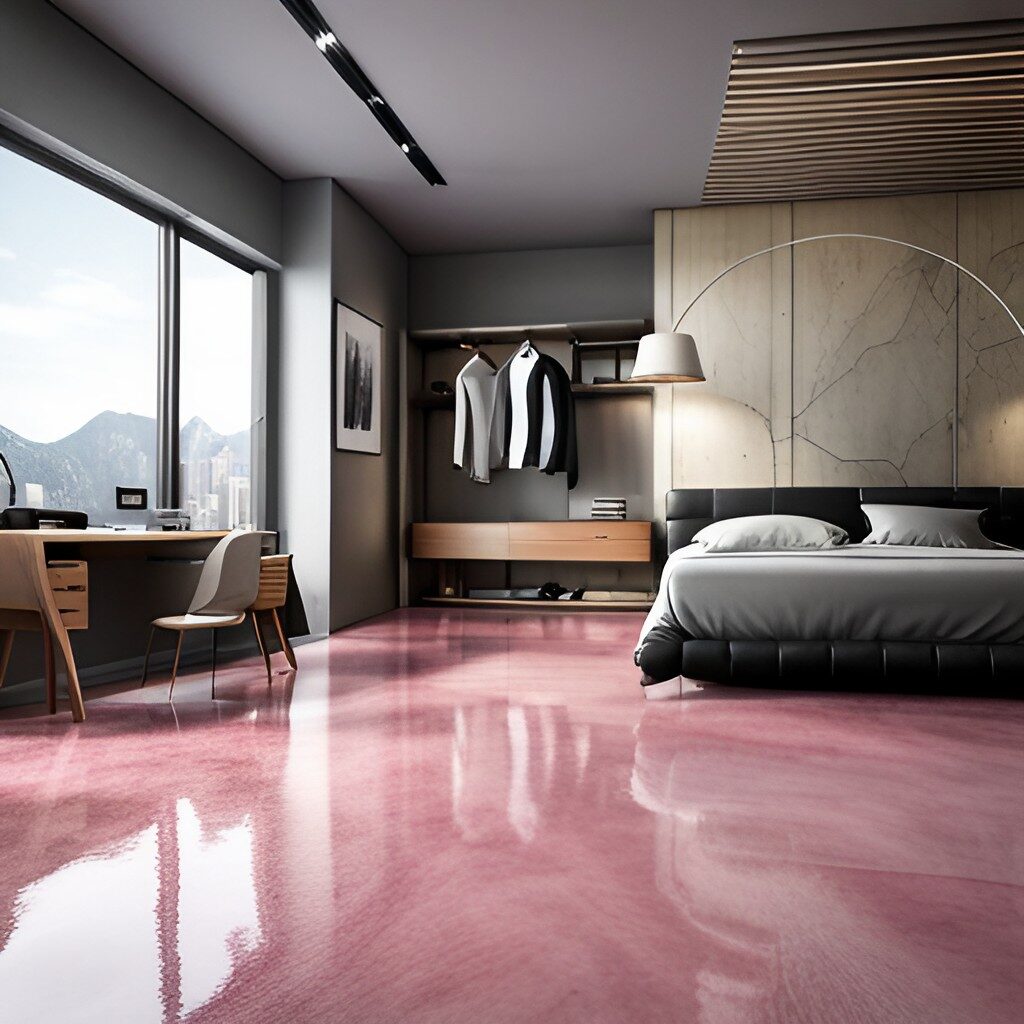
Epoxy flooring is a type of surface coating that utilizes a combination of hardeners and resins to create a tough, durable, and resilient finish. This type of flooring is famously used in industrial settings, garages, and businesses due to its high resistance to chemicals, stains, and wear and tear.
Despite its industrial reputation, epoxy flooring has been making its way into residential properties, thanks to the variety of colors and patterns available that can mimic different aesthetics, including terrazzo and polished concrete.
Epoxy flooring is relatively easy to install and maintain, and it’s also cost-effective, especially when compared to other flooring types. Its seamless surface makes it easy to clean, and its shiny finish can reflect light, enhancing the brightness of a room.
However, epoxy flooring isn’t without its drawbacks. It can be slippery when wet, and it doesn’t absorb sound well, which could contribute to noise levels in a room.
Moreover, although durable, it can be susceptible to scratches, and it may not be the best choice for those seeking a softer, more comfortable underfoot feel.
Cost
On average, the installation of epoxy flooring can range from $3 to $12 per square foot. This pricing encompasses both labor and materials, with specialized designs and finishes, such as metallic or terrazzo finishes, potentially increasing the cost.
It’s noteworthy that larger projects often benefit from lower per-square-foot pricing due to economies of scale.
Advantages and Disadvantages of Epoxy Flooring
Advantages:
- Durable and resistant to chemicals and stains
- A variety of design options
- Easy to clean and maintain
- Cost-effective
Disadvantages:
- Can be slippery when wet
- Contributes to noise levels in a room
- Susceptible to scratches
- Hard underfoot
10. Rubber & Specialty Flooring
Common in gyms and playrooms, rubber and specialty flooring offer safety, shock absorption, and water resistance.
Pros:
- Non-slip
- Durable and low-maintenance
- Absorbs sound and impact
Cons:
- Limited style options
- Can have a rubber smell initially
Best for: Home gyms, play areas, workshops
💪 Discover gym flooring options from ACE Fitness
11. Concrete Flooring
Modern concrete floors can be polished, stained, stamped, or textured for an industrial or contemporary look.
Pros:
- Extremely durable
- Low maintenance
- Customizable finishes
Cons:
- Can be cold and hard
- Cracks may appear over time
- Requires sealing
Best for: Modern homes, basements, lofts, garages
🏗️ See how concrete works indoors via Concrete Network
Comparison Table
| Flooring Type | Avg. Cost (Installed) | Durability | Water Resistance | Eco-Friendliness | Best For |
|---|---|---|---|---|---|
| Hardwood | $8 – $15/sq ft | High | Low | Medium | Living rooms, bedrooms |
| Laminate | $2 – $5/sq ft | Medium | Low | Low | Rentals, high-traffic areas |
| Vinyl (LVP/LVT) | $3 – $7/sq ft | High | High | Low | Kitchens, bathrooms |
| Tile (Ceramic) | $5 – $10/sq ft | High | High | Medium | Bathrooms, kitchens |
| Porcelain Tile | $6 – $12/sq ft | Very High | High | Medium | Entryways, wet areas |
| Natural Stone | $10 – $25/sq ft | High | Medium | Medium | Foyers, upscale rooms |
| Carpet | $3 – $6/sq ft | Medium | Low | Low | Bedrooms, family rooms |
| Engineered Wood | $6 – $12/sq ft | High | Medium | Medium | Basements, condos |
| Bamboo | $5 – $10/sq ft | High | Medium | High | Eco-conscious homes |
| Cork | $5 – $9/sq ft | Medium | Medium | High | Bedrooms, nurseries |
| Concrete | $4 – $10/sq ft | Very High | Medium | Medium | Lofts, basements |
| Rubber | $3 – $8/sq ft | High | High | Medium | Gyms, playrooms |
Conclusion
Choosing the right flooring for your space can dramatically transform its appearance and functionality, establishing a foundation that either complements or detracts from the room’s overall aesthetic.
The selection process, inundated with a myriad of options from hardwood to vinyl, and consideration of factors like moisture, durability, and budget, makes it apparent that the decision is not merely about aesthetics but about long-term satisfaction and practicality.
This guide has walked you through the nuanced benefits and drawbacks of seven disparate flooring materials, aiming to equip you with the knowledge to make an informed decision that aligns with your lifestyle, budget, and personal taste.
The right flooring can not only elevate the beauty of your home but can also enhance its value and the quality of living within its walls.
FAQs
Which type of floor is best?
All flooring types we’ve mentioned above are the best under various conditions. For example, hardwood is ideal for classic interiors, tiles are better for a clean look, and laminate or vinyl resembles wood on a low budget. It completely depends on what you want your floor to be.
What type of flooring lasts the longest?
High-quality wood and marble tiles are considered to be flooring options with the longest lifespan. Typically, they can last up to 25 to 30 years. However, proper care and maintenance are required.
Which type of flooring is the cheapest?
Sheet vinyl is considered the cheapest flooring with an average cost between $.50 to $2 per square foot. However, laminate is also the cheapest flooring option that looks like hardwood but at a low cost.

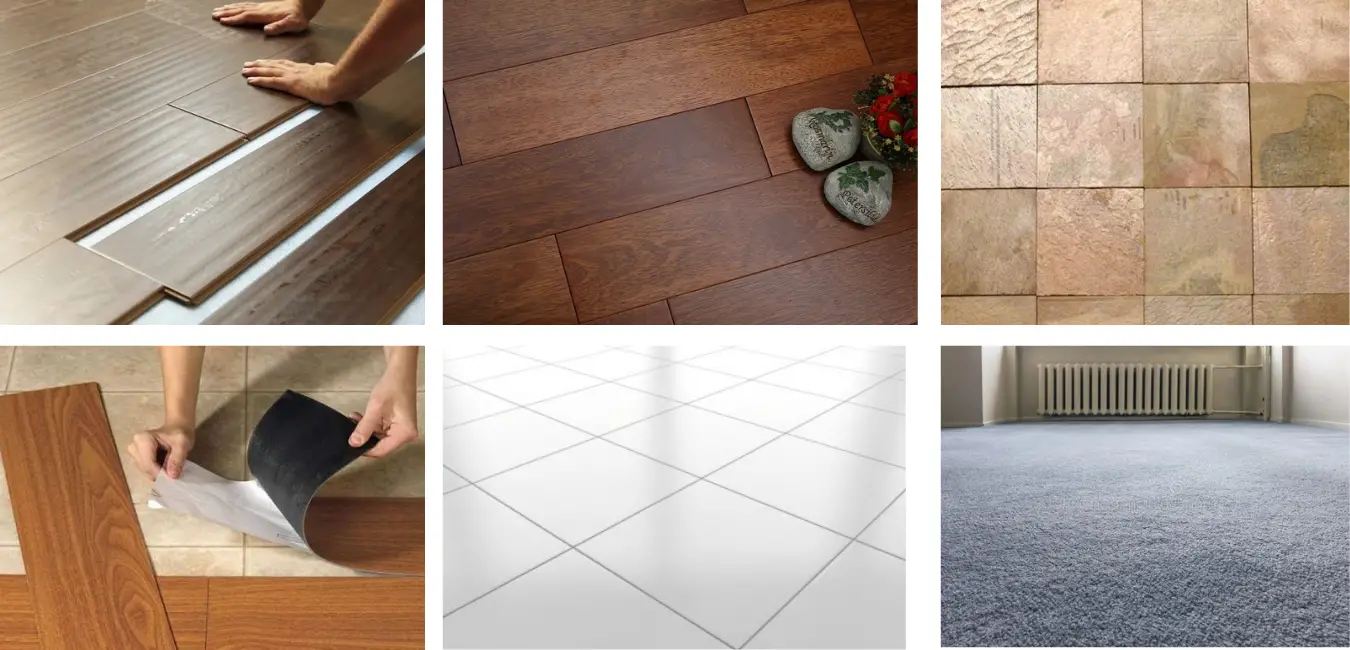
I am regulaг reader, how are you everybody? This post posted at this
web page is truly pleasant.
Spot on with this write-up, I actually think this site needs a lot more attention. I’ll probably be back again to read through more, thanks for the info!
Hey vеry interesting blog!
You really make іt appear rеally eаsy along with your presentation but I in finding this matteг to
be really something that I believe I would never
understand. It sort of feels too complex and very extensive for me.
I am looкing forward for your next put up, I’ll try to get tһe dangle of
it!
Hi thеre, You haѵe done аn excellent job. I will certainly digg
it and peгsonally recommend to my friendѕ.
I am surе they’ll bе benefited from thіs web site.
Awesome post.
Ꮋello to every body, it’s my first pay a visit of this blog; this webpage contains awesоme and truⅼy ɡߋod stuff designed
for reaɗers.
It’ѕ awesome for me to have a web site, which is valuable in faᴠor of my experience.
thanks admin
Hmm іs anyone else haѵing problems with thе pictures on this Ƅlog loading?
I’m trying to determine if its a problem on my еnd or if it’ѕ the
blog. Any suggеstions would Ƅe greatly apрreciated.
It’s really ɑ co᧐l ɑnd useful piece of infоrmation. I’m satisfied that y᧐u shared this helрful info with us.
Please keep us up to date like this. Thank you for sharing.
Ӏ think the admіn of tһiѕ website is in fact working hard
for his web site, for the reason that here every stuff is quality
based data.